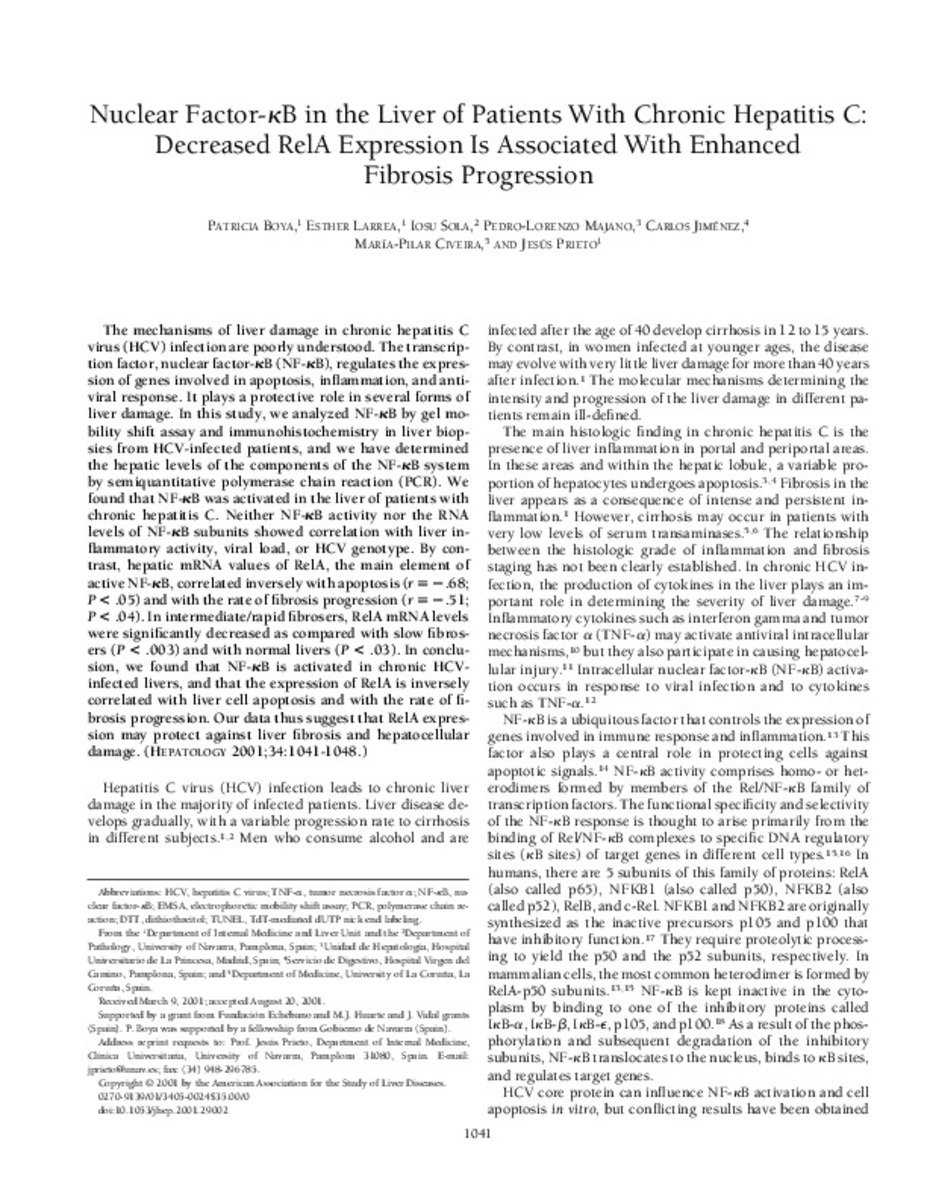Full metadata record
| DC Field | Value | Language |
|---|---|---|
| dc.creator | Boya, P. (Patricia) | - |
| dc.creator | Larrea, E. (Esther) | - |
| dc.creator | Sola, J. (Josu) | - |
| dc.creator | Majano, P.L. (Pedro Lorenzo) | - |
| dc.creator | Jimenez, C. (Carlos) | - |
| dc.creator | Civeira, M.P. (María Pilar) | - |
| dc.creator | Prieto, J. (Jesús) | - |
| dc.date.accessioned | 2012-10-05T12:51:24Z | - |
| dc.date.available | 2012-10-05T12:51:24Z | - |
| dc.date.issued | 2001 | - |
| dc.identifier.citation | Boya P, Larrea E, Sola I, Majano PL, Jimenez C, Civeira MP, et al. Nuclear factor-kappa B in the liver of patients with chronic hepatitis C: decreased RelA expression is associated with enhanced fibrosis progression. Hepatology 2001 Nov;34(5):1041-1048. | es_ES |
| dc.identifier.issn | 1527-3350 | - |
| dc.identifier.uri | https://hdl.handle.net/10171/23300 | - |
| dc.description.abstract | The mechanisms of liver damage in chronic hepatitis C virus (HCV) infection are poorly understood. The transcription factor, nuclear factor-kappa B (NF-kappa B), regulates the expression of genes involved in apoptosis, inflammation, and antiviral response. It plays a protective role in several forms of liver damage. In this study, we analyzed NF-kappa B by gel mobility shift assay and immunohistochemistry in liver biopsies from HCV-infected patients, and we have determined the hepatic levels of the components of the NF-kappa B system by semiquantitative polymerase chain reaction (PCR). We found that NF-kappa B was activated in the liver of patients with chronic hepatitis C. Neither NF-kappa B activity nor the RNA levels of NF-kappa B subunits showed correlation with liver inflammatory activity, viral load, or HCV genotype. By contrast, hepatic mRNA values of RelA, the main element of active NF-kappa B, correlated inversely with apoptosis (r = -.68; P <.05) and with the rate of fibrosis progression (r = -.51; P <.04). In intermediate/rapid fibrosers, RelA mRNA levels were significantly decreased as compared with slow fibrosers (P <.003) and with normal livers (P <.03). In conclusion, we found that NF-kappa B is activated in chronic HCV-infected livers, and that the expression of RelA is inversely correlated with liver cell apoptosis and with the rate of fibrosis progression. Our data thus suggest that RelA expression may protect against liver fibrosis and hepatocellular damage. | es_ES |
| dc.language.iso | eng | es_ES |
| dc.publisher | Wiley-Blackwell | es_ES |
| dc.rights | info:eu-repo/semantics/openAccess | es_ES |
| dc.subject | Hepatitis C, Chronic/metabolism | es_ES |
| dc.subject | Liver/metabolism | es_ES |
| dc.subject | NF-kappa B/metabolism | es_ES |
| dc.title | Nuclear factor-kappa B in the liver of patients with chronic hepatitis C: decreased RelA expression is associated with enhanced fibrosis progression | es_ES |
| dc.type | info:eu-repo/semantics/article | es_ES |
| dc.relation.publisherversion | http://onlinelibrary.wiley.com/doi/10.1053/jhep.2001.29002/abstract | es_ES |
| dc.type.driver | info:eu-repo/semantics/article | es_ES |
Files in This Item:
Statistics and impact
Items in Dadun are protected by copyright, with all rights reserved, unless otherwise indicated.






